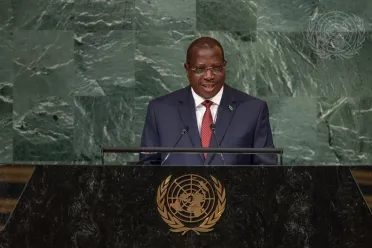Statement
Statement summary
PHILIP ISDOR MPANGO, Vice-President of the United Republic of Tanzania, said human greed, selfish desire and unilateralism were the root causes of conflicts and geopolitical tensions, the pandemic’s devastating effects, food and energy insecurity, extreme climate change, stubborn poverty and barriers to shared prosperity. Referencing the Kiswahili proverb, “Where there are problems, ingenuity increases,” he called upon the international community to uphold a caring spirit to ensure the needs and happiness of other peoples and nations and to adhere to the credo of multilateralism and collaboration.
Focusing on the COVID-19 pandemic, he underscored the need for national and global health systems to be better prepared through investments in building health infrastructure, expanding the health workforce and enhancing national and regional capacity to manufacture drugs, supplies, vaccines and medical equipment. While the late provision of support and financing highlighted the need for African countries to work together on developing indigenous solutions, he acknowledged and thanked development partners for their support on pandemic response and recovery.
Expressing appreciation for the upscaling of mitigation and adaptation efforts under the Kyoto Protocol and the Paris Agreement on climate change, the most vulnerable countries, he noted, continued to be disproportionately affected and without the capacity to effectively respond. While the United Republic of Tanzania has committed to ambitious adaptation and mitigation targets, there must be “immediate, rapid and large-scale reductions in greenhouse gas emissions”, he said, to limit global warming. He called on the international community to ensure reliable access to climate finance, abide their commitments to the Paris Agreement, enhance capacity-building and technology transfer, support adaptation and mitigation measures and create a financial facility on independent loss and damage. In emphasizing Africa’s need for a just transition to renewable energy, he also called for the opposition to global financing and the implementation of hydrocarbon projects to be lifted as “our Sovereign rights to pursue transformative projects should be respected.” Carbon credit markets must be transparent and must benefit Africa fairly.
On international peace and security, he pleaded for continued focus on the safeguarding of human lives and well-being, especially those of children and women. Citing the disruptive effects on global supply chains, he reminded all of their responsibility to pursue the peaceful resolution of conflicts by leveraging their abundant resources and human capabilities. As the United Republic of Tanzania is proud of its participation in five of the existing 16 peacekeeping missions, he offered additional contributions if requested. Reaffirming his country’s continued and active participation in regional peace initiatives as a member of the African Union Peace and Security Council, East African Community (EAC) and Southern African Development Community (SADC), he called upon the United Nations to enhance its support to regional peacebuilding and peacekeeping efforts.
As the credibility of the United Nations rests on a well-represented and responsible Security Council, he reiterated the common African position for the long-awaited reforms. Echoing the Ezulwini Consensus and the Sirte Declaration, he said: “it is well past time the United Nations Security Council reflected the present-day realities of the United Nations membership and not that of the 1940s.” In acknowledging the first global celebration of the Kiswahili language on 7 July while commending the efforts of the United Nations in promoting multilingualism as a core value, he reaffirmed the United Republic of Tanzania’s resolve to uphold peace and security, development and human rights. All Member States, he urged, must renew their commitment and prioritization of actions especially on the 2030 Agenda for Sustainable Development.
Full statement
Read the full statement, in PDF format.
Photo

Previous sessions
Access the statements from previous sessions.
